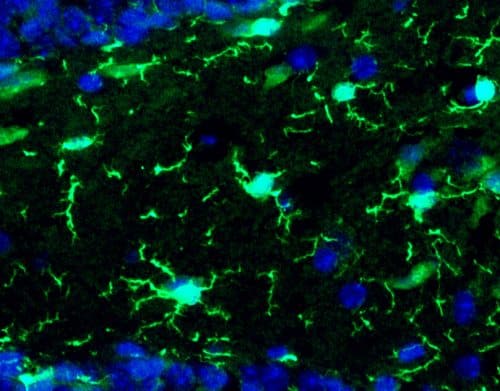Findings may explain the connection between the mother's infection with viruses during pregnancy, and autism and schizophrenia in the offspring

Disruptions in the development of the immune system in the fetus, following the mother's infection with the virus, may lead to brain damage that manifests later in the offspring. This is according to a study in mice carried out at the Weizmann Institute of Science and Asher Releasedin the scientific journal Science.
These findings may explain, among other things, how the mother's infection with the CMV virus during pregnancy, which affects her and the fetus's immune system, increases the risk that the offspring will develop autism or schizophrenia, sometimes many years later. This increase in the risk of brain damage was discovered several years ago, in studies on the prevalence of neurological diseases in different human populations, and was confirmed using mouse models. The current study, which they carried out Dr. Ido Amit וProf. Michal Schwartz from the Weizmann Institute of Science, brings up a possible explanation as to the mechanism responsible for the injury.
"Studies carried out in the past showed a connection between the timing of the disruption in the mother's immune system during pregnancy, and the type of brain injury in the child. For example, infection with viruses in the early stages of pregnancy increases the risk of autism, but infection in later stages of pregnancy increases the risk of schizophrenia," says Dr. Amit. "We set out to examine the mechanism that generates these phenomena, focusing on the role of the immune system in the development of the brain."
The joint research student of Dr. Amit and Prof. Schwartz, Orit Matkowitz-Nathan and other members of both research groups focused on the only immune system cells found in the brain, called microglia, which contribute to the development of the brain and later to its maintenance. The scientists discovered that the development of these cells in the brains of mouse embryos, as well as immediately after birth, takes place in three stages, which correspond to different stages in the development of the brain: early cells, those that populate the brain at the beginning of its development, pre-microglial cells and mature cells. Through comprehensive scans and tests of the cell genome, the scientists defined the stages in which different genes are activated, the control processes of these genes as well as their epigenetic characterization, i.e. the control of the "packaging" of the genetic sequence which affects the expression levels of the genes during development. Later in the study, the roles of some of these genes in microglia were also characterized, which contributed to a deeper mechanistic understanding of the developmental processes.
The second stage, the pre-microglia, turned out to be particularly sensitive in terms of the consequences of the timing of its development on the fetal brain. This stage occurred close to birth and immediately after it, at the exact time when a very important process known as "pruning" takes place in the developing brain because it involves the removal of unnecessary links (synapses) between nerve cells. The pre-microglial cells play a decisive role in this "pruning": they participate in the elimination of unnecessary nerve networks and in the remodeling and strengthening of the connections between the remaining nerve cells. When the scientists exposed the brains of the pregnant mice to synthetic substances simulating the damage caused by the CMV virus, they found disruptions in the development of pre-microglial cells in their offspring. The timing of the expression of the genes involved in the maturation of these cells was disrupted, and the cells entered the mature phase earlier than normal. Such offspring later develop behavioral disorders, including those similar to schizophrenic disorders in humans and impaired social skills.
"We discovered how essential the correct timing is between the development of immune cells in the brain, and the development of the brain itself," says Prof. Michal Schwartz. "Premature maturation of microglial cells in mice leads to later brain damage". These findings, obtained in a study in mice, led the scientists to hypothesize that the violation of the timing of the development of microglial cells and the development of the brain (and the coordination between them) is what contributes to the high risk of developmental brain diseases, such as autism and schizophrenia, in humans. Such a violation occurs as a result of the mother's infection during pregnancy with viruses that damage the immune system.
"Our research opens an opening for studying the effect of additional viruses and the mother's immune system in general, on brain development, as well as for studying developmental neurological diseases and their connection to the immune system," says Orit Matkovits-Natan.
In a series of additional experiments, the scientists found that there is a connection between the development of the microglial cells in the brains of the mice and the bacteria in the intestines. They found that the absence of intestinal bacteria in the mice, after birth, caused a delay in the maturation of the microglial cells. This finding implies that factors that affect the composition of the intestinal bacteria in babies, such as breast feeding or the use of antibiotics, may affect the immune cells in the baby's brain and consequently also its brain development. At this stage it is still unclear how much this research, carried out in mice, is valid for humans, but the scientists hope that understanding the mechanism of this process will lead to the fact that in the future it will be possible to prevent certain neurological injuries caused to babies as a result of disruptions in the mother's immune system.
Also participating in the study were Dr. Deborah Winter, Amir Giladi, Eyal David, Dr. Hadas Keren Shaul, as well as Dr. Eran Alinev and Christoph Taheis from the Department of Immunology, and Hila Ben-Yehuda, Dr. Mirav Cohen, Dr. Kuti Baruch From the Department of Neurobiology. Matkovits-Nathan and Amit Spinard, another research student, belonged to both departments. Scientists from France and Germany also participated in the study.
